Robert Cowlin speaks on high fidelity sound, the compact disc and Terminal Gods new album, Wave / Form. 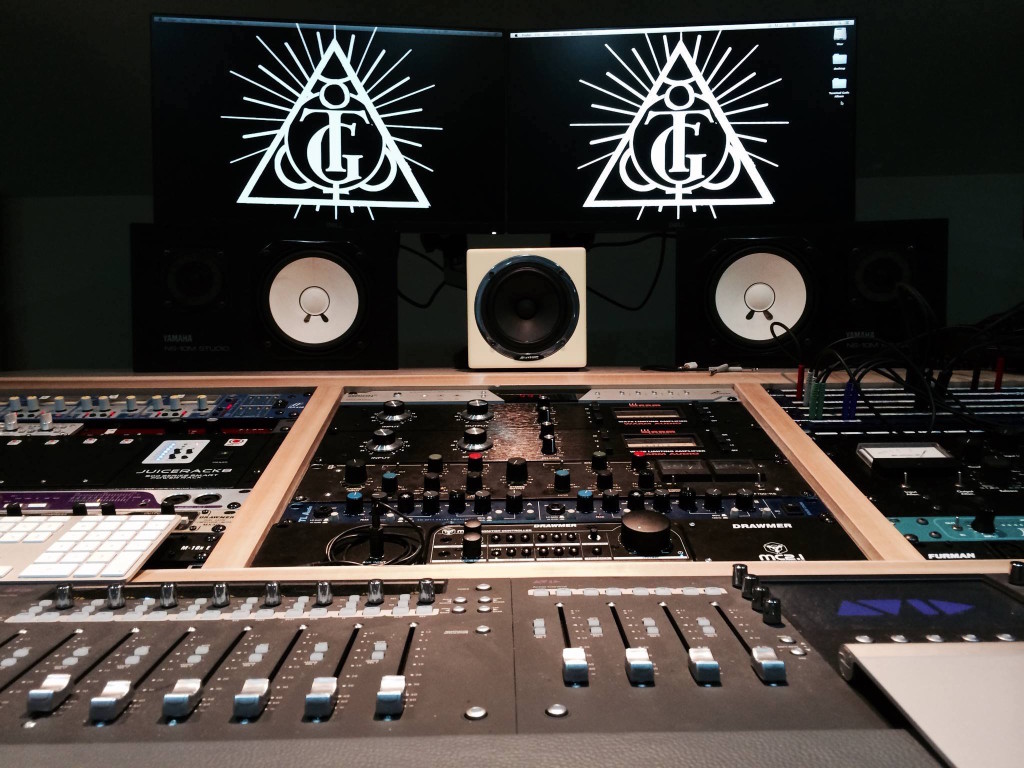 Wave / Form, the new Terminal Gods album, sounds fantastic. We have Robert Cowlin (vocals) here to tell us about what special efforts were put into making this fine recording. Robert is a music fan, audiophile and collector, as well as a musician and nightlife promoter with keen interests in sound technology.
Wave / Form, the new Terminal Gods album, sounds fantastic. We have Robert Cowlin (vocals) here to tell us about what special efforts were put into making this fine recording. Robert is a music fan, audiophile and collector, as well as a musician and nightlife promoter with keen interests in sound technology.
- Robert, we have had many conversations regarding the merits and drawbacks of the Compact Disc medium. Would you care to tell our readers briefly about the difference between older and newer CD recordings and how you have taken care to record your album in the better pre-“loudness war” method?
I think the science of making a good recording, such as microphone placement and capturing room ambience, hasn’t changed much in decades. Unfortunately, since about 1995, mixing and mastering engineers have been squishing the dynamics on recordings, which makes them sound lifeless and fatiguing. It’s not the fault of the CD format, in fact the dynamic range available with digital recording is far greater than tape, rather it is the erroneous thought that a compressed (and thus, “louder”) recording is going to sound better than a dynamically accurate one. This is something we as a band are becoming more aware of, thanks to articles by the BBC; conversations with hi-fi enthusiasts; and just a growing awareness that many recordings by our contemporaries sound awful on anything remotely approaching good playback equipment. Unless someone is listening through laptop speakers, high amounts of dynamic range compression aren’t necessary, and who wants to make their art for laptop speakers? One of the primary aims with this record was to do the tracks justice, one of the ways to achieve that was to produce recordings that sound great on just about anything (except, maybe, laptop speakers). Consequently, we took great care to ensure that a neutral tonal balance and natural level of dynamic range was maintained throughout the whole recording, mixing, and mastering process. Indeed, we had to audition quite a few engineers who just couldn’t help themselves when it came to the boost-the-bass-and-compress-the-track-to-hell button, but we finally settled on a select few individuals who shared a similar passion for recorded sound that we do. One thing we were very strict with was the use of mix-bus compression. It’s either not there, or used very sparingly – much to the frustration of our producer! We insisted on this so that our mastering engineer had the most amount of headroom to work with when running our tracks through his outboard chain.
- You aren’t known for exploring really quiet topographical sounds in the way that classical music does, but it is still a factor in the nuances of the recorded music. Assuming that you recorded lower and less densely than is typical, did this affect the dynamic range in any noticeable way?
We recorded at the same level as we always have; the difference is we didn’t add any destructive compression in the mixing or mastering. What you hear on the record is pretty much what the tracks would sound like in a really good live setting. As a result, our record is roughly twice as dynamic as most contemporary rock albums (and as dynamic as many pre-loudness war rock albums). This doesn’t mean the record is quiet, it just means that the difference between loud and quiet sections is more natural than one would expect from a contemporary release where you might find a whisper is often as loud as the entire band playing. We’ve always loved older recording styles; this is just another way of making our record sound more authentic.
- Sometimes great live bands have difficulty translating their music to recorded media. Some of the rawness gets lost, or sometimes the recordings lose their saturation and sound empty for the clarity of the studio mix. What care did you to take to keep the isolation of elements crisp and yet maintain the fantastic mixture of power & feeling that Terminal Gods live shows are known for?
I actually like the difference. One song in particular, Movement, has quite sparse instrumentation that really lets you ‘see’ into the recording and focus on various instrumental subtleties that ordinarily would be lost on the toilet venue circuit. Power and feeling is all about capturing the instrument correctly at the recording stage, and using an EQ that suits the instrument. In relation to this question, our shows are only as good as the sound engineer can make them. I think we’ve surpassed a lot of that on Wave / Form. We always sound better in bigger venues; I think the album reflects that.
- As a stereo recording, this album has 2 channels with different sounds for the right and left speakers. What type of stereo separation technique & theory did you use to determine what would be in channel 1 and what would be in channel 2 on this great disc?
It’s quite simple, really. Our engineer did some draft mixes and we listened to them at home, imagining a stage and picturing where the instruments are (good playback equipment does this for you). Is Josh’s backing vocal in the same place as his rhythm guitar? If not, why not? Are the drums behind the vocalist? Is the bass in the centre? Is the guest pianist in his own space? Once each instrument had its own position on the soundstage, everything fell into place quite naturally. The stereo separation on this record is a little treat for the listeners who have taken the time to set their speakers up correctly, or invested in headphones that do imaging well. Whether or not you actually want Terminal Gods in your living room is another matter entirely.
- Was it a lengthy process to get the right performances in the studio? I imagine that it would have gone quite smoothly, but please elaborate on any peculiar or difficult moments, if can.
In total we spent about 10 days recording, and another 4 overdubbing errors. We’ve learnt over the years that we tend to do better on our own, so we go in on separate days to record and do our thing, then come together halfway through to review and think about changes going forward.
- Did you use much equalization or effects on the raw tracks that would not have happened at a live show?
Maisey, lead guitar: Yeah, loads. This is fairly common practice – EQ is often used as a sound sculpting tool, as well as just a means to tidy up the edges. Some old school engineers would argue this is frivolous though! In terms of housekeeping, it’s important to roll out the frequencies that aren’t doing anything other than eating headroom. Especially your extreme tops and bottoms. Creatively, you may just like to push a certain aspect of your instrument (for example, we favour a lot of mid-range and string sound in the bass guitar). I read an excellent interview with the guy who made the first Birthday Party album about how he just maxed the EQ at 2k on all the guitars just to piss them off and they all loved it. I try to do this kind of thing a lot, but Cowlin usually gets in there and demands to know why I’m deliberately fucking up our mix.
- Would you like to tell us about your studio components and the room used in the recording process?
Maisey, lead guitar: The Blue Studios are extremely user friendly, which is its best and, at times, worst feature. It’s a digital studio that uses a controller instead of a desk, but features some decent mic, pre-amp, and compression options for crafting your inbound signal chain. We used Sontronics microphones on nearly everything and a set of Golden Age Neve pre-amp clones and a set of Focusrite Reds in the chain after that. Really I would have liked more outboard to have been involved in every stage of the mix, but you work with what you’ve got! The room itself is pleasant to record in, but deliberately quite dead sounding. It hasn’t really been built for “character”. A nice touch is the addition of marble tiling in some areas of the live both, for a more aggressive top end response for certain mic placements.
- How about your instruments, drum machine(s) and gear also? What technology helps make Terminal Gods? How is it special to this recording?
Maisey, lead guitar: That’s a bit like asking a doting parent about their kids. I could talk for a long time on that subject and still tell you nothing. The drum machine is a Yamaha RX5 which, in hindsight, I think I could have done a better job getting the best sound out of. There’s lots of mucking about with the synths that we found lying around the studio as well. I’m especially pleased with the fizzy Nord sound we added to Shockwave. To be honest I was having a bit of a guitar crisis at the time of recording. My 12 string had imploded (although it made reappearance during the over dubs sessions) and I was using a 6 string I wasn’t all that happy with. I ended up recording most of my parts on the studio’s Les Paul. Given the chance I’d happily go back and do the whole album’s worth of guitars and drum machines again, utilizing the things I learned while making this record! For me, the instrument that makes Terminal Gods is – and always will be – the Robert Cowlin vocal acrobat. He always tries to reign them back in the studio for a more “professional” take – and I spend a lot of time goading him into more improbable performances. In many ways, the juxtaposition between this cool reserve and a maniacal desire for chaos has become one of the defining features of our sound – and it’s quite possible this is the first record where that has started to become apparent.
- Many pop musicians have their albums tailor made for playback on cheap car stereos, laptops and other small & limiting systems since they expect they will get the most exposure through those common devices. As an audiophile, I know that wasn’t your choice. When you recorded this album, did you do so with a particular sound system in mind for playback? What was it designed for? And also, if different, what optimally would you like to hear it played on?
During the mixing and mastering process we frequently took draft versions of the tracks home to listen to. We all have high fidelity setups at home with a mixture of vintage and modern gear. The Blue Studios has a particularly dry sound in the mixing room that none of us are truly used to (we’ve never listened to our favourite records in there over a prolonged period, therefore we can’t know what sounds ‘right’ in that room). It is difficult to make meaningful decisions regarding the sound in a room one is unfamiliar with. I suggested we all listen to the recordings at home, on systems that we are very familiar with, and come back with suggestions and improvements for our engineer. Most of the time, our feedback was in agreement with each other – which was quite comforting. So, essentially, we made the album sound good on our stereos! We also have other setups that we road tested the recordings on: I have a dedicated headphone rig and we were also able to preview the album in mono in the studio which helped us pick out some anomalies. I don’t agree with the idea that a record should sound good on a car stereo, you’re not even sitting in the middle! Who tailors a movie to look good on a smartphone? If it does happen to sound good in the car then that’s great, but I am reluctant to make critical changes to a recording simply because it doesn’t sound good with one window wound down at top speed. For me, the challenge was getting the recording to sound good on a high-spec system, something that is very revealing and unforgiving. If it can sound good there (and, I believe, it does) then it should sound good anywhere. I don’t really mind what the album is played back on, so long as it’s with something that was designed to play music. iPod, Hi-Fi, headphones – great. Don’t listen to it on a phone unless it’s known for good playback and don’t listen to it as an mp3. We took great care to ensure that the recording is optimised for both vinyl and CD. Consequently, our fans should buy the version that will be best presented on their individual setup. If you’ve got a piece of junk all-in-one turntable and an iPod, buy the CD. If you’ve got a dedicated turntable setup with separate speakers and amp, and a smartphone, buy the LP. If you’ve got a high fidelity DAC and a brilliant turntable with separates, buy both.
- Another slightly related question of a personal nature; What is your “dream system” stereo?
Something that conveys everything in a recording without ever being fatiguing or frustrating, does such a system exist? I recently fell in love with Rega’s line of amplifiers and digital players. I’d like to hear their flagship system one day. I wonder if they’d sponsor us.
- Most sound systems are incapable of playing very low frequencies and it takes very good equipment to do justice to a demanding power-hungry recording full of low bass. However, I really enjoy hearing *and feeling* the lowest quaking bass sounds. Did you make any choices about the low end of your recording?
Jon is a great bass player and all too often on modern recordings the bass guitar and kick drum interaction is the first thing to go in the pursuit of LOUDNESS. I was very insistent that we translate as much of the bass as possible, without it swamping into the midrange. We don’t really write songs with super deep bass so that wasn’t a major concern of ours during recording. We just wanted to preserve what we had.
- What about the high end? Compact discs are particularly great at capturing the full spectrum of the audible upper end in recordings and doing so without the hiss or crackle of older mediums.
I think the treble on this recording sounds pleasantly detailed without ever being shrill or bright. A hint of poorly positioned EQ would tip it into the territory of brashness which I was keen to avoid. I want people to get to the end of the album and play it again, not be fatigued by an overly strident top end.
- Related to the above questions; Please share with us your thoughts on MP3s and other commonly used formats that lose tremendous amounts of sound information and yet are widely popular.
MP3s are great, I can fit thousands of albums in my pocket and download them really quickly! Oh, wait, it’s not 1997. It’s 2016. I can buy a 2 TB hard drive for £60, internet speeds are mostly good, and people are walking around with stupidly expensive headphones that are perfectly capable of producing the entire audible spectrum and revealing the deficiencies of MP3 data loss. And yet, some people are actually offended when you give them anything higher than a 192 kbps MP3. Why?
I think the music industry has really dropped the ball on this one. Look at the home theatre industry, everyone – from the cinephile to the layperson – knows that bigger is better when it comes to recapturing the cinema experience at home. Look at the popularity of big televisions, HD broadcasting, blu-ray, soundbars, AV receivers. This has all been casually accepted in pedestrian life thanks to the largely positive anti-piracy campaigns run by the movie industry. It makes sense that, if you want higher quality than a bootleg DVD, you’re going to need to invest in formats and technologies that allow high quality images to be viewed in the home. You can walk into someone’s living room and not bat an eyelid at a home cinema set up. Walk into a music enthusiast’s living room and see anything more advanced than an iPod dock, and suddenly it’s “niche” this and “how much?” that. Rather than promoting better sound quality and ‘the musical experience at home’ (as the industry correctly did when CD was introduced), the music industry seems to have floundered at the turn of the century and come up with… Spotify. Imagine if the home cinema industry had done the same thing: “Oh, well pirating movies onto laptops is really popular, so let’s scrap 4K and widescreen and surround sound and put everything out on a 5-inch screen”. Think of how ridiculous that sounds, then think about MP3. The problem is, your average person streaming films on a laptop knows they’re making a compromise, whereas the average person streaming Spotify to their phone thinks: “this is good enough for me”. This is where the music industry has failed. It has failed to further the art and appreciation of recorded sound in the mainstream.
MP3 has its uses, but if you’re a music fan then you’re doing yourself a major disservice by hindering the quality of your listening, all for the sake of file space. You wouldn’t buy a book with half the pages chopped out.
- How did the rest of the band feel about your attention to detail and meticulous “old fashioned” sound quality demands? Was there any conflict during the recording process?
It took a while to convince some of them of the merits of a high quality recording (thanks, largely, to the problems outlined above). However, the more they listened to the difference between dynamically compressed modern recordings and pre-loudness war ones, the easier that convincing became!
- What digital format did you submit for mastering? Tell us about its merits and any part of the process that could be of interest.
The files were .wav format (uncompressed files) at a sampling rate of 96 kHz and a bit depth of 24 bits. This is more or less the standard for modern recordings (note how the industry goes to great effort to ensure an enormously high recording standard, only to compress and down convert for mp3s and laptop speakers – weird). 24 bit has an extremely low noise floor, which means you can make as many edits as you want in the digital domain without introducing audible quantisation errors. Vinyl fans will be pleased to know that the masters used for vinyl are 24/96, the CD of course uses the redbook standard 16/44.
- Were there any songs that were left off the recording due to not fitting in with the others as a whole? Was the overall composition a difficult choice or did it happen organically (perhaps with a little weeding)?
There were some additional sketches that we dropped or reworked during the writing process, but everything we demoed was eventually recorded properly for the album. Road of the Law is available on a separate 7”. The only song we recorded during these sessions that is yet to find a home is a re-recording of The Card Player from our Lessons in Fire single. We felt that the new recording didn’t really fit with the other tracks, so it’s been left off for now.
- Thank you for your time. I encourage everyone with an ear to buy this fantastic sounding compact disc!
Preordering is available through Bandcamp.~DJ Jason

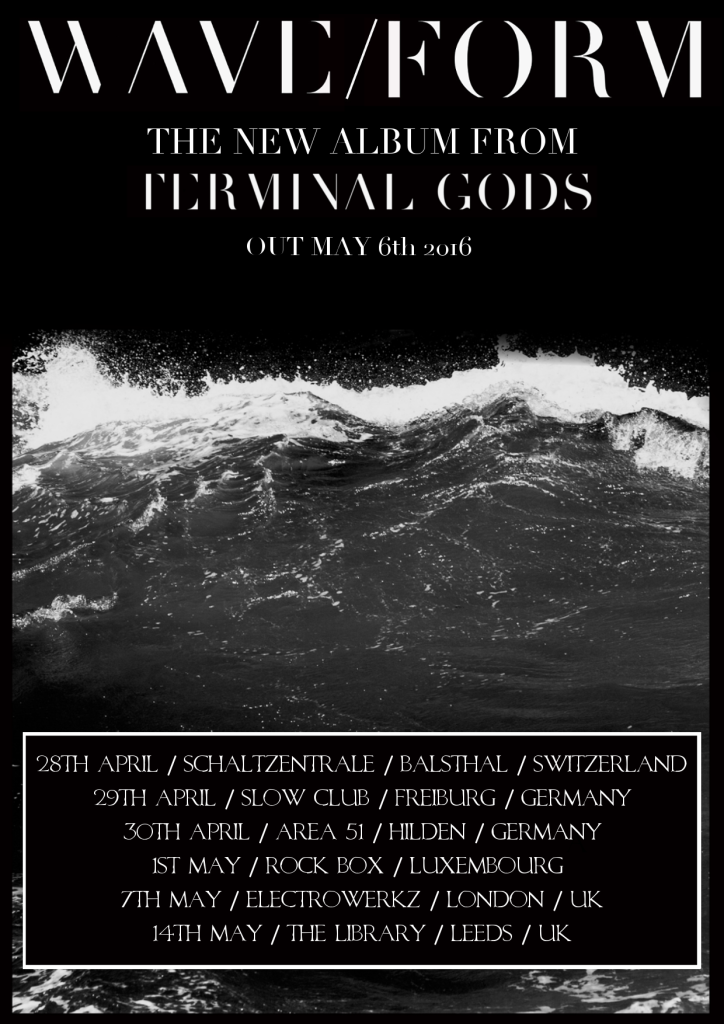
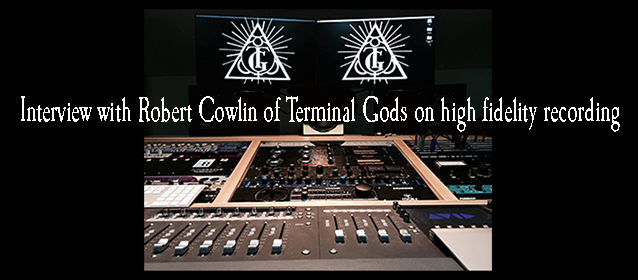
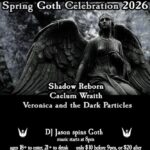
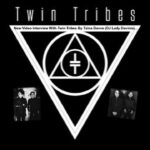
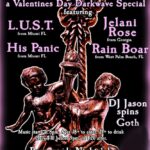
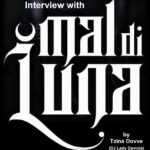
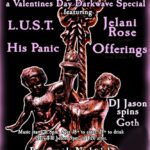
“Wave / Form is the number 1 selling Post Punk *and* New Wave album on Bandcamp” ~Twitter
Really fantastic article! Terminal gods are ace and dj jason knows the deal like no other dj. Good heavens it is sweet to read something well written and smart for a change. Goth usually gets the cobweb treatment.
Thank you for reading it & for the nice comment, Brandy!